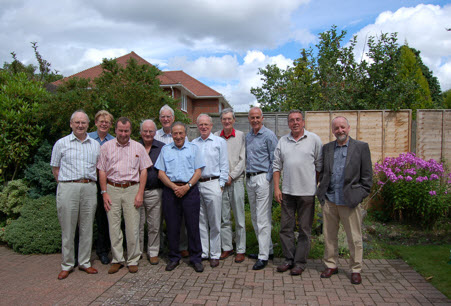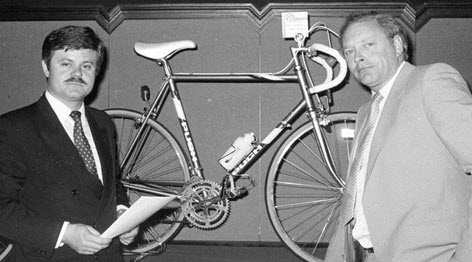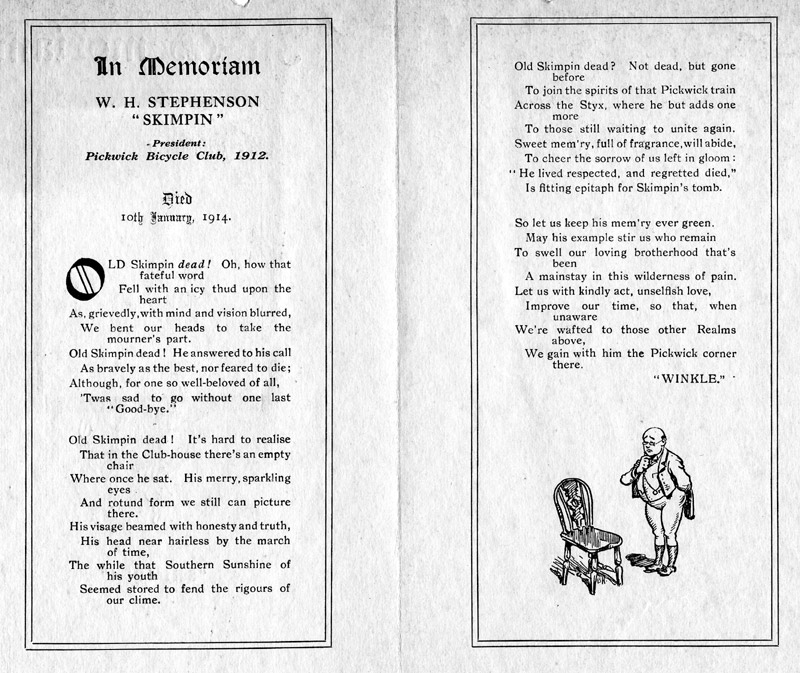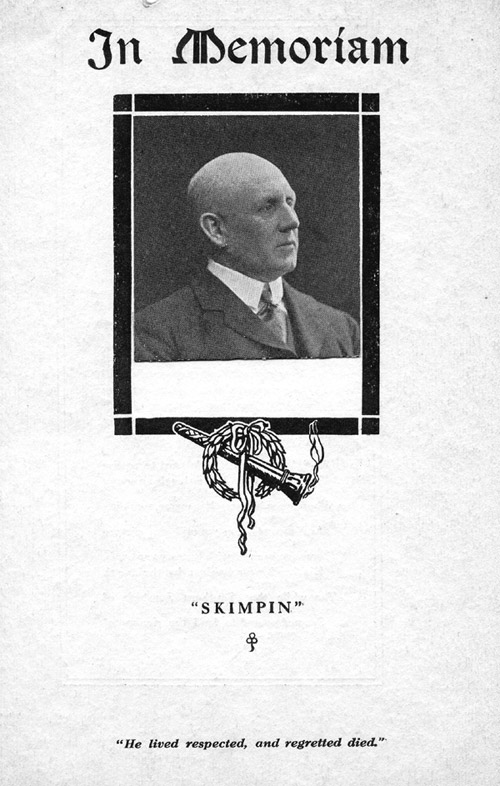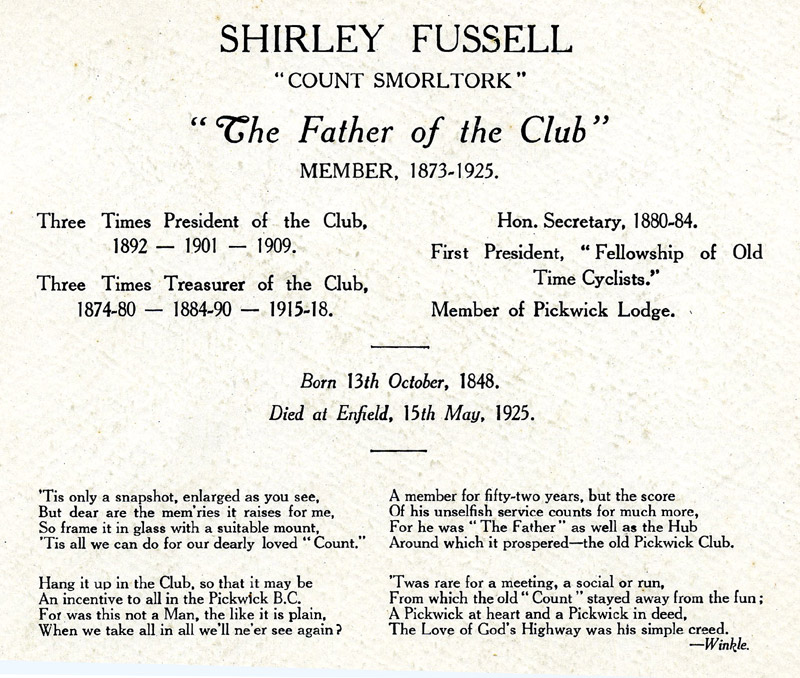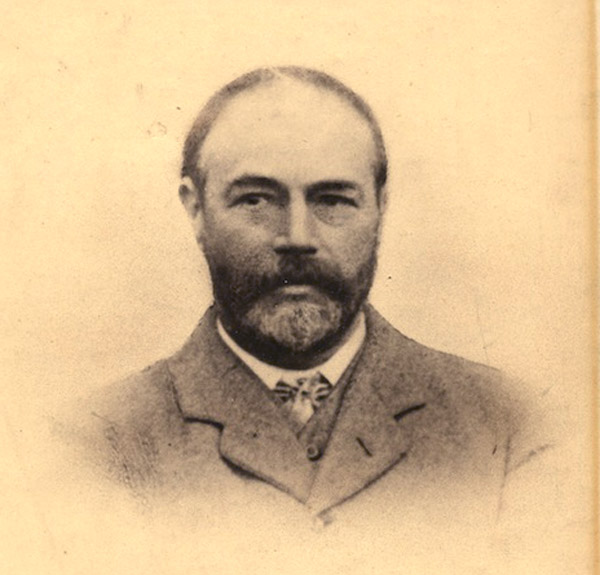
|
||
Obituaries
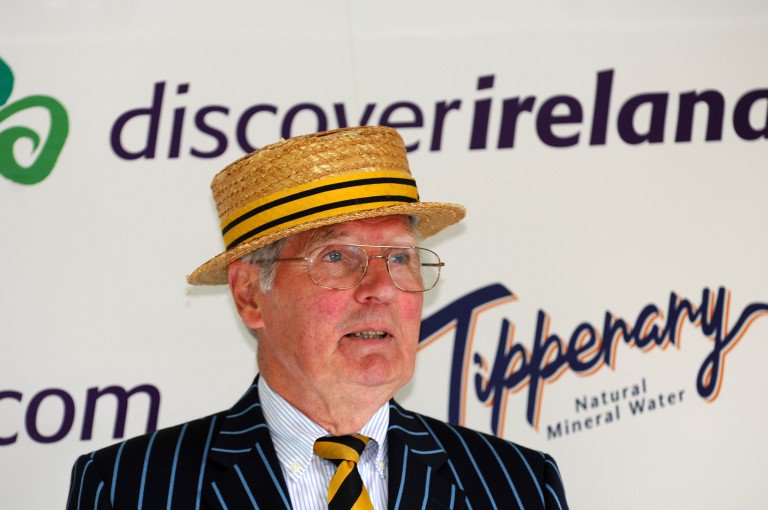 David Duffield sadly passed away on Sunday 21 February 2016. Read more at Cycling Weekly Our colleague and member Mr Slasher (aka Derek Keen) is another great loss. The obituary is from from Peter Magnus and is followed by a letter to the deceased’s son, also a member of our club. We are saddened by the peaceful passing of Mr Slasher (Derek Keen) who was diagnosed with oesophageal cancer in September, died on Friday 14th December 2012 aged 82. He Joined the Pickwick B.C. in 1986. He joined the Comet C.C. in 1947 . In 1965 when the Comet and Crescent Wh. amalgamated, He was a founder member of The Lea Valley Road Club of which he was President for three years. In November 1969 with partner Mike Henighan they broke the Road Records Association Cardiff to London Tandem Trike record by 20m 57s in a time of 6h 42m 06s. This was done in terrible weather conditions and their chain breaking twice. He was a good club man organising garden parties and social functions. Derek was a top class Silversmith engraver and was know by many London clubs and sports organisations who have their trophies engraved by the company he founded. Derek was also the organist for 26 years for the Lodge of the Open Road, a cyclist Freemasons Lodge. He was also the Organist for an believable 92 (ninety two) lodges. He leaves is wife Evelyn and father of Michael, Loraine, and Don. He lived respected and died regretted. Peter Magnus
Tom Cummins, aka John Dennis
John was elected to the club in 1998, some seven years after his retirement from an illustrious career in both cycling and journalism. Several obituaries have been written and a selection are reproduced here which show how very popular and accomplished he was. Mr Warren (aka Stuart Benstead) wrote: John was a founder member of the Sports Writers’ Association. He was then racing editor of The Bicycle under another founder member, Peter Bryan, who is living in Bournemouth. Following the takeover by Cycling magazine, John moved into motorsport magazines and later into PR with British Leyland Group. From there he moved to Volvo on the commercial side until his retirement. John was a successful sprint cyclist in his younger days at Herne Hill track near where he lived, and at other tracks across the country. He missed the 1948 Olympics as a tandem rider through injury, being replaced by Reg Harris and Alan Bannister, who went on to win the silver medals. He contributed to the sport in many ways throughout his life, including several years as manager of Herne Hill, promoting international meetings and starting up the Cycle Sport magazine. Upon his retirement he and his wife Shelagh took the reins at the ailing race scene at the Palmer Park track in Reading. He built up a volunteer team to the point where the track thrives and now hosts national championships. Although in failing health for a long time, he took particular pleasure in the success of Bradley Wiggins as, when a youth rider Wiggins was a regular competitor in races promoted by John at Reading. There was a private woodland burial on 11th February, with a celebration of his life the following day at Winnersh, near his home. From Peter Ansell, Norwood Paragon CC It is with sadness that Norwood Paragon CC announces that former President and Life Member of the Norwood Paragon CC John Dennis passed away peacefully at home on 24th January at the age of 86 years. John had been in ill health for some time. John joined the Paragon in 1946 and proved to be an outstanding track rider. The pinnacle of his cycling career was being selected to ride the Tandem Sprint in the 1948 London Olympics. Unfortunately, injuries sustained in a crash two weeks before the Games put him and his partner Ivor Cox out of contention, their places being taken by no other than Reg Harris and Alan Bannister. In 1950, John set a new National record of 23.0 seconds for the ¼ Mile Human Paced Flying Start, the record was never beaten before all track records became metric. John’s racing career ended in 1951 after breaking his collarbone for a second time and turned his attention to fulltime promotion of track racing at Herne Hill. These promotions were world class events which packed Herne Hill every Saturday during the summer for a number of years. John also found time to manage a number of British teams in overseas classic events before turning his hand to journalism, working on “The Bicycle” and “Cycle Sport” for nine years. A spell of working in Japan whetted his appetite for Keirin racing and in 2004 he promoted the National Keirin Championship on behalf of the Paragon as part of the club’s Centenary celebrations. John, with support of his wife Shelagh rejuvenated the Reading Track League, which went on to be one of the country’s leading leagues. Forever the character he never accepted the norm, he will be missed by all who knew him. John Dennis was well known and highly respected in the motor industry and there have been glowing dedications to him in several of the industry’s trade publications. The following is just one such item from the pen of Tim Blakemore, Managing Editor which appeared in his “Commercial Vehicle Engineer”. John Dennis A highly-regarded doyen of commercial vehicle journalism and public relations died of heart failure last month, aged 86. John Dennis’s long and distinguished career as head of Volvo’s truck and bus press and public relations in the UK came to a normal end in 1991, when he retired. But the style, enthusiasm and intelligence he brought to the job continues to be remembered fondly by journalists and public relations managers alike. Mr Dennis first entered road transport journalism on two wheels, as a racing cyclist. He rode tandems which set international records in 1951, and would have been in British team at the Olympic Games of 1948 if not for a training accident.
A garden gathering When AEC was taken over by Leyland Motor Corporation in 1968, managing director Donald Stokes moved Mr Dennis to the Lancashire head office to direct Leyland public relations. But Mr Dennis’s determination to be candid and open with journalists led to clashes with his boss. So when haulier Jim McKelvie came looking for someone to mastermind public relations at his fledgling Volvo truck sales and marketing operation in the UK, Mr Dennis jumped at the chance. Back in London and with greater management freedom, Mr Dennis then went from strength to strength, soon gaining a reputation for innovative pr schemes. On one occasion he hired a complete London Underground train to take journalists and truck operators to the theatre. At a tipper truck show in Harrogate North Yorkshire he arranged for Volvo tipper operators to be entertained by Ken Dodd.
Sven-Erik Lindstrand worked in the Volvo Truck Corporation head office in Gothenburg, Sweden at the same time as John Dennis headed Volvo’s truck press and public relations operation in the UK. “I liked him a lot,” says Lindstrand, now a freelance international commercial vehicle journalist. He would look into your eyes and listen really closely to what you had to say. We had to keep on top of many Volvo Truck public relations operations around the world, but not the UK’s under John Dennis. He was very proactive and used to bombard the head office with lots of questions and ideas.” Mr Dennis leaves a wife, Shelagh, a son and a daughter. February 2013 Commercial Vehicle Engineer
Mr.Blotton (of Aldgate). (aka JOHN MOORE) My searching for words since the phone call from Derbyshire telling of John Moore’s passing comes no easier. I still haven’t caught my breath that, gone from our midst, is this man who blessed the British bicycle business scene like no other in recent decades. Ahead of the rest he influenced how others saw and reacted to High Street fashion and needs; working to build his company large and offer more than it all looked in the thick product prospectus was his feat. He may not have been alone on the bicycle marketing front, yet he was so very much The Leader: of that there can absolutely be no argument. People have done very well from that rare ethos of top service and careful understanding he instilled through a Team partnership which has put the country’s two-wheel family in such good stead. What he offered from those early days opened opportunity - gained well beyond the respecting of a gut feeling, following just as much what went on at the heart of things and in the head. He figured it so well, didn’t he! It’s no great distance from the Watford shop where he began with family business, on through Luton to Derby and where the still-family-style international operation wheels powerful influence beyond county and country boundaries. Yet, the business has always revolved - evolved - with people who made the grade because of the the way John Moore was able to identify what was needed, when it was needed. His style of man-management put the person first, something I witnessed at his then-headquarters in Luton: that day my first ever visit to Moore Large & Co was to sit at the family-table set up, where we all sat up together. That system introduced people, overlooked barriers, opened dialogue, levelled the pitch: so clever, considerate, caring. Copy, for there is no better indicator for the way forward in this business sector! John Moore united his blood family with the staff family, to fuse a seamless, peer body of bicycle business understanding that incrementally has defined market success. On the sales front the brands mix and the offer delivered from the centre of selling at Derby, or from the linkage of the Cash & Carry operation that took the wholesaler function closer to the local shop door, it was so in-tune to the needs of moving product from the factory and warehouse to the end-consumer. More lately he became the universally respected gentlemanly father-figure influencing a mostly home-grown Team, moulding loyalty and ability and merchandise as a real and true currency, all supported by a richly talented business offer from today’s Moore Large operation. Everything that the company achieved along the way is based on vision: as happened with bringing to the market outsourced product from the emerging supply chain of the Far East. That wasn’t doing the expected, but John Moore anticipated the way things were changing, and he was giving a slice of the action to his customers. The whole Moore Large company embarked on the mission to deliver to the Retailer the product which matched the needs for the shop-floor counter, and for retailers it really worked. It also worked for the people that his style of leadership had - and has - drawn into the company fold, people who interfaced the shopkeeper with the had - and has - drawn into the company fold, people who interfaced the shopkeeper with the company warehouse and manufacturing partners. Rivals weren’t overly enthusiastic with this display of thought-through energy, and across an industry which engaged in a war of wheel words, the Starley House Brigade rallied and reacted. That brought John Moore to express regret that the dues his company paid into the industry association were actually used to engage an affront on his business. Perhaps it was the antidumping scenario which fuelled and defined the outcome: John Moore missed arriving in Coventry as their chain-wearing leader - certainly his rightful place - at the Bicycle Association table, where he held such a prime position. Today, with his passing, that now near-neutered manufacturer-marketer body can never elect the best-ever, most able, viable President of recent decades. It remains so much a mystery to outsiders, the politics of the occasion, and look what was lost. As I have already written . . “people have done very well from that rare ethos of service and understanding” which John Moore ensured was delivered. Looking closer at The Man, how will I remember him? As being totially Genuine, a man honestly concerning himself with how your today was making out; he was never afraid to help with understanding - or, more to the point - help right a misunderstanding, if that was needed. And didn’t he love the game of cricket! How much happier I would be today if I was allowed to write “78, and not out” but Life isn’t quite like that: within the week or so John would have made his 78th birthday.
Forever, I’ll have The Big Man in mind at this time of year or whenever “for auld lang syne” is the lyric. Expanding that thought, these words: “and there’s a hand my trusty friend! And give us a hand o’ thine! And we’ll take a right good-will draught, for auld lang syne”. The last time I stood close with John Moore was not yet a month past, at The Pickwick Bicycle Club Christmas Party in London. The gathering all sang lustily - and did so with arms linked - not realising his voice, his presence, would soon be lost. For me, as I pen these words there is the realisation that we don’t get back what we have lost here, but what we can do is honour the legacy, respond to the touch of the Big Man that was John Moore. Peter Lumley peter@tradeandindustry.net Twitter: @prlumley Peter Hamon "The Hon.Wilmot Snipe"
Pickwick Bicycle Club Magazine. Volume 9 No.2 July 2012
It is with great sadness that we report the recent loss at an early age of a friend and colleague, The Hon.Wilmot Snipe (Peter Hamon). Peter Hamon died unexpectedly on the 9th of April 2012 following a short illness. Peter was just 68 years old, not a great age in modern terms. He was born in 1943 and lived and was educated in St Albans and went on into electrical engineering. He worked hard at his career and by the time of his retirement in 2001 had risen to the position of Managing Director with a company in Welwyn Garden City that manufactured electrical switchgear for industrial and commercial applications. From early on Peter was attracted to cycling. He was a member of the Verulam Cycling Club and met his wife–to-be, Margaret, through his activities there. Both Peter and Margaret were heavily involved in club life and sat on club committees and organised club events. They were the moving force that set in motion the Verulam Open 25 mile time trial, which came to be a high profile end of season event. In recognition of his efforts, Peter was awarded Life Membership of the club. Although Peter had lived all his life in Hertfordshire and Bedfordshire when he retired he moved to Watton, in Norfolk, where he and Margaret had several friends. Still retaining his Verulam membership Peter found time to join in with the C.C. Breckland and was racing in local events up to last season. He was proud to be elected to membership of the Pickwick Bicycle Club in 1996 taking the sobriquet “Hon Wilmot Snipe”, frequently attending club functions. He also had many friends in the “G.S.Lanterne Rouge”, of which he was a member, and will be missed at their dinners and club runs. Peter was also a member of the “Pedal Club” and travelled to London monthly for their lunches.
Although cycling was Peter’s main love he always followed top level sport and could often be found in front of
the television giving an opinion on the performance of England’s cricketers, footballers and rugby players in
situations at home and abroad where his thoughts could have made a vital difference !!
Both Peter and Margaret also supported the East Anglian Children’s Hospice at Quidenham and donations in memory of Peter should be sent to EACH, Quidenham, Norwich, NR16 2PH. Please mention Peter’s name when you do so. Peter is survived by Margaret, his wife for 41 years, and daughter Kerry. A Humanist ceremony was held at Watton on the 20th of April to celebrate his life. A large number of friends, family and cycling colleagues attended and listened to music by Eric Clapton, Don Williams and Tina Turner.
“ Simply the Best “ – Peter Hamon. 1943 – 2012.
Mr Wicks (Jim Mepham).
Charles W Messenger “Smouch” Chas Messenger, who has died aged 94 after a period of failing health, was an uncompromising race organiser and cycling historian who made a massive contribution to cycle racing in Britain. After the death two days earlier of the Merseyside organiser Ken Matthews, Messenger's passing marks the end of an era, that of the men who, against the odds, carved out a niche for the sport in the second half of the 20th century. Within British cycling he became so synonymous with sadistically hilly races that, to this day, older cyclists describe tougher race circuits as "Chas Messenger courses". Born and brought up near St Pancras, central London, Messenger worked as a fireman during the second world war, as a bike shop owner and for the Thames Water Authority, but his priority was cycling, even if he modestly described his own racing career as mediocre. He was a prime mover in the British League of Racing Cyclists (BLRC), the organisation that founded road-racing along European lines on British roads after the war, in the teeth of opposition from the UK governing body, the National Cyclists' Union (NCU). In 1958, he was chosen to be the organiser of the Tour of Britain when the Milk Marketing Board (MMB) took over sponsorship. He ran the race until 1964, "exhibiting a love of distance and hills" as the writer Les Woodland put it. "Over the brown" - the colour used on maps to shade in high ground - was the phrase that Messenger used to describe his routes, and the distances in the race manual might well be under-estimated. Not surprisingly, there were complaints from the riders after seven-hour stages across the Pennines. However, his running of the event set the tone for a race that became a national institution - the Milk Race - under MMB backing until the 1990s. Having helped to pave the way for the merger of the BLRC and NCU in 1958, Messenger became the national road-race team manager, his career culminating in the world championship of 1967, in which Beryl Burton won the women's race and Graham Webb the amateur event. He lost the job soon afterwards, but returned to the forefront in 1982, when he stepped in at short notice to run the world road-race championships at Goodwood. Messenger was a unique character. One rider recalls him entering the changing rooms before a junior event and telling the participants: "If the speed goes below 20mph I'll disqualify you all. I don't want any of that creepy- crawly stuff we saw last week." As the chairman of the Paddington Track League in the 1980s, he would exhort the riders to perform over the microphone, and might openly criticise those he felt were not contributing to a race. He put up cash prizes for those who were willing, for example, to make the effort to jump from bunch to break, and was cavalier if minor rules got in the way. On one occasion when he had exceeded the limit for rider numbers on the track, and an official turned up, he simply told the cyclists to "keep moving, lads" so that they could not be counted. He was utterly dedicated to the advancement of his sport. When the Paddington track - the last velodrome in central London - came under threat, he negotiated with the council to save it, as he thought, only to be thwarted. After that, it became his personal mission to find a replacement, and he ran races on a circuit at the sewage works in Isleworth, before recognising the potential of the unopened bypass at Hayes. There were no facilities - he and his wife, Olive, set up a picnic table - but among those to benefit were Bradley Wiggins, a double gold medallist in Beijing last month, and another Olympian, Roger Hammond. After Hayes, Messenger was behind the foundation of the permanent west London circuit at Minet Park, Hillingdon. Messenger produced several histories of the various Tours of Britain, including Where There's a Wheel, Cycling's Circus and Cycling Crazy, all published by Pelham in the early 1970s, and most recently his history of the BLRC, Ride and Be Damned (Pedal Publishing, 1998). All were written in an enthusiastically slapdash style, a whirl of tenses and ideas that was unique to the man. Away from cycling, he played badminton, went cruising in the Caribbean and was a fine cook. For the past five years, Messenger's contribution to his sport has been recognised thanks to the running of a two-day race bearing his name, which this year was part of British Cycling's elite Premier Calendar series. In spite of his poor health, Messenger was there this May to present the prize to the winner, Russell Downing. He remained the senior vice-patron of British Cycling, the UK governing body. His wife predeceased him and he is survived by his son, Charles, and two grandsons. Charles "Chas" Messenger, cycling organiser and historian, Obituary in The Guardian http://www.thepedalclub.org/archives/goldenbook/a-e/ChasMessenger.html Bob Chicken "Angelo Cyrus Bantam" Bob Chicken, founder of cycle distributor RJ Chicken & Sons, has died aged 90. An active member of the British cycle industry since the mid-1940s, Chicken retired from his business to Madeira, where he passed away late last week. Chicken was the subject of Graeme Fife's biography, Bob Chicken: A Passion for the Bike, published in 2005 which charted the life of one of the most influential, likeable and colourful characters that the cycle industry is ever likely encounter. RJ Chicken & Sons is run by his two sons, Robert and Cedric. The company distributes many well-known cycling
brands, including Time, Cinelli, Tifosi, Deda, Nalini, Miche, Sapim, Selle Italia and many others. Obituary in Cycling Weekly 
Gerry (Gerald) Nutland Burgess “Red-nosed Mr Stiggins” 1920-1999 Racing driver who beat the snow to win the RAC Rally in 1959 Gerry Burgess, who has died aged 78, overcame a Scottish snowstorm to win the RAC motor rally of 1959. By the night of November 17, snow drifts had made impassable the Nairn to Braemar section of the 1,900 mile race. With his co-driver Sam Croft-Pearson, Burgess was one of the first drivers to spot an alternative route around the mountains. Their Ford Zephyr was one of the few cars even to reach the time-control post in Braemar. This tough and enterprising drive was characteristic of a man who enjoyed his motor sport in all weathers and in all countries. The RAC rally that year ended in chaos. Fewer than half of the 131 competitors who had set off from Blackpool on the Tuesday arrived at the finish at Crystal Palace on Friday night, having been tested to breaking point by conditions in the Highlands and Wales. Protests about the course were lodged by three well-known foreign drivers, and it was almost a week before official confirmation of the number and order of the finishers could be given by the RAC. There was no doubt, however, that Burgess had won, although good fortune smiled on him to the end. As he drove into the final control point at Brands Hatch, his Ford collided with another car, but luckily no serious damage was caused to his own vehicle. It was Burgess’s first rally victory but the end of an era for British motor sport, as no home-grown driver would win the RAC rally again until 1972. Gerald Nutland Burgess, always known as Gerry, was born in Brownstown, Co Kildare, on December 22 1920. He was educated at Christ’s College, Finchley, and soon developed an interest in bicycle racing. As a member of the Polytechnic Cycling Club, he won the British Amateur Tandem Championship in 1939, his riding partner being Lew Pond. Later, at the height of his rallying career, although bulky and prematurely balding, Burgess was always as fit as his rivals. For this he credited his cycle training. Like all rally drivers of the period, Burgess was not paid a fee – only expenses. He had to build up his own business to be able to afford to drive. In 1943 he founded an engineering business which soon became a leading supplier of components to the motor and air industries. He also established a company making lightweight bicycle components, and later another that made banqueting chairs. In the 1950s, after a series of sterling performances in his own cars in the Monte Carlo and Liege-Rome-Liege rallies, Burgess was invited to join the BMC works team, for whom he drove a variety of Austin and Austin-Healey cars. He transferred to the Ford factory team in 1959. During the 1950s and early 1960s, Burgess took part in rallies all over the world. In 1955 he took fourth place in the Monte Carlo Rally, and in 1962, in the East African Safari, he won his class for the Ford works team in a Zephyr Mark 3. The 3,600 mile route was enlivened by encounters with lions, hyenas and zebras. Jomo Kenyatta was delighted by the event and fixed a Safari badge to his ministerial Mercedes. In 1964, Burgess took part in the first Monte Carlo Rally to have a Russian starting point; competitors set off from Minsk in sub-zero temperatures in cars sporting steel-spiked tyres. By now, however, the sport was becoming the domain of professionals rather than of those who drove for fun. Burgess retired from competition and spent the next 30 years in business. He was president of the overseas section of the Ancien Pilotes of the Monte Carlo Rally, and after retiring to Monaco in 1988 was a regular attender of the reunions which took place during the Monte Carlo Rally and the Monaco Grand Prix. He married in 1941, Joan Clark; they had a son and two daughters. Obituary in The Daily Telegraph
Eric Charles Tyler "Richard Upwitch" 1912-2003 During his 44-year tenure at TI he held directorships of a number of Group companies, but his principal responsibilities were with Reynolds. Reynolds “531” and “753” became the world standard for cycle and motorcycle tubing during the 50’s and early 60’s, and he became a well-known part of the Isle of Man TT race scene each June. In 1939 he married Sylvia Blater, daughter of Frank Blater, Managing Director of Lemet Metal Works of Birmingham, and moved to Solihull. Born August 14, 1912 in Batham, SW London: educated at Selhurst Grammar School, Croydon. At 17 years of age he became a shipping and accounts clerk for the LEP Transport Co based at Sunlight Wharf in the Port of London. With economic conditions becoming difficult in 1933, he took the initiative to contact a company whose bills of lading he noticed frequently passed through his hands. This company, Reynolds Tube Co. Ltd of Tyseley (later TI Reynolds) offered him the position of Assistant Company Secretary and in that December he moved to Acocks Green. With the waning of the cycle trade in England, he began promoting the company’s expertise in welding special lightweight alloys in Europe and the USA. Simultaneously, he recognised the future of the burgeoning aerospace industry and Reynolds became one of the founding members of the Society of Aerospace Constructors (SBAC). From this time and beyond his retirement in 1977 he became an equally familiar part of the Farnborough Air Show scene. Although he regarded Birmingham and Solihull as his real home he maintained a love of London, conducting many historical walking tours of the Square Mile or the Wren churches. He was recently recognised as the oldest member of the Pickwick Bicycle Club which was founded on the death of Charles Dickens and which was patronised by luminaries of the cycle and publishing worlds. He was the 120th President of the Club in 1973, and in 45 years of membership missed only 2 club gatherings. He is survived by his wife, daughter Ann, son Chris, and five grandchildren. Funeral service at 2:00pm, Thursday 8th January in St Michael and All Angels Church, Gt. Wolford, Warwickshire. Joseph Smiggers remembers that Eric thoroughly enjoyed the company of the ladies, and he was keen to see them at lunch on a regular basis - once every hundred years being frequent enough... Tribute by Joseph Smiggers (Steve Bullen) published in The Birmingham
Post Cedric Dickens "The First Country Agent"
Well hidden behind the benevolent and studiedly bumbling persona, however, was a brilliant managerial brain. He treated everyone he met with exactly the same courtesy, yet he had an uncanny knack of getting people to do things they did not think they were going to do or even could do. He worked indefatigably to save the George and Vulture, the historic inn in the City which Charles Dickens used in his fiction as a frequent venue for Pickwick’s peregrinations and in his own life as a favourite watering hole. (They still have the cheque for £11 the novelist gave them after entertaining 34 friends there in 1837). Cedric worked ceaselessly to preserve the heritage of Gad’s Hill, now a girls’ school, the last home of Charles Dickens, and he was a firm ally of the house in Doughty Street, now a museum, where his great-grandfather first lived as a young married man. Cedric Dickens was born in 1916, the grandson of Sir Henry Fielding Dickens, sixth of Charles’s ten children, an eminent lawyer and Common Serjeant of London, and his wife, Marie Roche, a Frenchwoman who saw to it that French was the first language Cedric spoke, though he claimed to have forgotten it. His father was Philip (Pip), a chartered accountant who became the first secretary of ICI at Billingham-on-Tees. He lived with his parents in Durham from 1924 to 1929, spent Saturday mornings at the works with the head engine driver, and as a boy he once travelled to London on the footplate of the Flying Scotsman. He went to Eton and Trinity College, Cambridge, and after taking three trips to the West Indies by banana boat joined the British Tabulating Machine Company in 1937. He liked to say later that the company took it amiss when he joined the RNVR in 1939 – as they saw it, to enjoy himself instead of working on decoding at Bletchley Park. In fact, he had an adventurous war, ending it as a first lieutenant. While serving at Portsmouth he met his future wife, Elizabeth, when the sight of her as a young Wren at the wheel of a truck caused him to fall off his bicycle. She stopped to help, and he liked to claim that he had been literally picked up by the most beautiful girl in the world. They were married in 1948 and had two children, John and Jane. It was a radiantly happy marriage that was to last 58 years. After demob Cedric rejoined his firm, which after several mergers became ICL (International Computers Ltd) where he became director of communication. Cedric organised a series of luncheons for influential City men who were potential customers for the new technology. He took them to the George and Vulture, to which his French grandmother had introduced him at the age of 17 when he was already under the thrail of The Pickwick Papers. It proved a fruitful venue. On a lighter note, he organised a series of cultural tours to London hostelries that had a Dickens connection. The tour would take in five pubs on the south side of the Thames and a further five on the way back. At the first pub, Cedric would typically call for a Guinness and order another for the landlord. After two minutes Cedric would give the order “everybody out!” and the party would move on to the next pub where he would order a different drink. Not surprisingly, most of those exposed to one of these cultural tours had only a confused memory next day of where he had been; Cedric knew precisely. When Cedric retired in 1976, the company decided not to continue the lunches and cultural tours. By this time, however, Cedric had built up such a coterie of convivial characters who took such pleasure in them he decided to carry on by himself. So the Dickens Pickwick Club was born. It was not the first: the City Pickwick Club was founded in 1909, for example, and the Pickwick Bicycle Club in 1870. Cedric was intimately involved in both. The format of his own club hardly changed over the past 30 years. At about 5.30pm the bar is opened. Each member is given a sobriquet taken from a character in the immortal book, and it is Whiffin who calls “Wittles – Gentlemen – Wittles”. All present reply “Muffins”. A fine edition of The Pickwick Papers is then tabled, grace is said and members attack a meal that is heroic in its political incorrectness. Potted shrimps are followed by silverside of beef and dumplings, treacle tart by stilton. The officers present their reports at one minute each and toasts are drunk to absent friends, fathers and sons present, and guests. After the Loyal Toast comes the big speech of the evening – to the immortal memory of Charles Dickens. There are more toasts and, after grace, The Pickwick Papers is removed but the bar remains open. It says much for the fascination of the club that one typical evening recently members sat down from Dublin, Sydney, the Netherlands and Texas. So deep is the affection felt for Cedric in America that the Philadelphia Pickwick Club is to hold its own memorial service for him in April. The dinner last December was well up to the usual form. The “immortal memory” was proposed by the jazz musician Campbell Burnap, “official and personal trombonist to Mr Pickwick”, in a remarkable speech on Dickens and music laced with a number of recorded tunes with a Dickensian connection. Cedric was in his customary roaring form. He asked for the usual silence for those members who “had gone ahead to the great tavern where we shall meet again”. Later he remarked – almost in an aside – that he would not be with them at the next annual dinner. But he knew that it would go on as ever, spreading and celebrating what he called, in the last of his five books, the miracle of Pickwick. Cedric Dickens, steward of Charles Dicken’s legacy, was born on September 24, 1916. He died February 11, 2006 aged 89.
From The Times, 22nd February 2006 
Bob Thom "The Suffolk Bantam" It is said that the only certainties in life are death and taxation. Members of the Pickwick Bicycle Club being honourable gentlemen naturally pay whatever tax is due. Most of them have lived a healthy life and reaching a grand old age is the norm rather than the exception. Amongst our membership of nearly 200 are some interesting characters. One of them was the Suffolk Bantam (Bob Thom) who died on the 1st August and whose funeral took place on August the 16th. When your scribe arrived at the ceremony the room was full to overflowing with at least a dozen people standing outside. Despite the fact that the Suffolk Bantam was 87 years old he had remained an active cyclist until a year or so ago and a large number of his cycling friends were present having arrived by the means of transport which was the basis for establishing the Club and, for many, is their preferred means of getting around. Following the ceremony and the departure of the mortal remains there was a convivial gathering outside apart from your scribe at least 14 other PBC members present. Thereafter most of the assembled company repaired to a club at Codsall near Wolverhampton where a reception had been organised by the family. Apart from the Pickwickians and family and other friends, a large number of friends and acquaintances from the cycling world was present. Many of them had been top class racing cyclists in their youth with careers having been managed by Bob. The Book of Remembrance was almost a Who’s Who of cyclists from the 1940s through to the 1980s. An entertaining address was given by Pete Matthews who summarised some of the notable events during Bob’s life. He started cycling before World War II and joined the Wolverhampton Wheelers where he remained a member until his death. After his military service he joined the BLRC and won many major events and was a National Professional Road Race Champion in 1949. He retired in 1951 and thereafter managed a variety of teams including Viking Cycles. He was a mechanic when Ian Steel won the Peace Race in 1952 and was also a mechanic in the Tour de France. An alternative claim to fame is that he was a stuntman and extra in the film “A Boy and a Girl and a Bike” which also starred Diana Doors. He had been President of Wolverhampton Wheelers, the English Schools Cycling Association and The Pedal Club. He finally retired from cycling in 2003. He suffered a stroke at the end of January and, although his inherent fitness and his concern that the vineyards would lose trade kept him going he finally succumbed on 1st August 2004.

Bill Bannister “Ramsey” Bill Bannister was born in 1917 and raised in Kentish Town, moving to Harrow Weald in the early 1930’s. First rode a bike to the local fish & chip shop to buy the family’s supper on Friday evenings. Joined the Harrow Cycling Club and became their BAR at age of 16. Met a lifelong friend, Alec Symon riding home from a 25 in the mid 30’s and joined him in The Marlboro AC – Bill’s club for the rest of his life. Bill married Theresa just before going on to serve overseas in the war. They remained a devoted couple and team throughout their lives. In the army Bill quickly earned a commission. While rarely speaking of his war experiences he was proud to have fought at Anzio. Bill also served in The Middle East, Belgium, France and Germany, coming out of the army a much wiser man with the thoughts of “never again”. Bill worked at the Daily Mirror Newspaper Group as a compositor and took every opportunity to help cycle sport by pushing news into the sports pages under the News Editor’s nose. He worked hard for The Marlboro too – with recognition by being elected President. Busying with the niceties of the sport he became a timekeeper, Chief Judge and Commissaire. Bill was a passionate supporter of road racing throughout its turbulent development. Many were the events that profited by his able work. Bill’s many years in the sport will remain as a testament of loyalty and devotion. For many years he was a mainstay of the West London Division Committee, including 20 years as secretary. A great respect is owed to Bill for what he achieved for cycle sport and the sacrifices he made to do so. Bill was a sensitive and intelligent person who loved riding his bike, with interest in later years turning more and more to the youth with the highlight of appointment as President of the Hillingdon Slipstreamers U16 club, and The Viking Wheelers. He will be sorely missed as an official and a friend for he was everyone’s friend. Bill endured illness with bravery for 3 years and fought hard on his last lap all the way to the line. Sadly his wife Theresa passed away shortly before him after 64 years together and he leaves behind children; Sean, Jane and granddaughter Kate. Sleep well Bill. Its now time for a “Spritzer”. Tribute by “Smouch” (Chas Messenger) R D F Paul "Nathaniel Winkle, Esq." Since our last circular a great character has been removed from our circle. “Pickwick”, our Captain has been and is a great Pickwickian and leader, but the passing of “Mr Winkle” has taken from us not only a past President, but a “binder”. He was the link between the old and the new, and with skill he welded the traditions of the Club into the minds of the new recruits. He was the “cosmopolitan Scot” – whether in Paisley, Canada or London, he made his personality felt. In Paisley and surrounds he was in close contact with sport, and is mentioned in the Jubilee Souvenir of the Amateur Athletic Association. It is recorded in one season he headed the list of his Club by securing 16 prizes. He was a member of the St Mirren Club, the name which in later years he gave to his house in Barnet, where he entertained in true and lavish spirit his friends of the wheel, whether old ordinary, two-wheel or four. Perhaps his greatest regret was that owing to the weakness of the flesh he and so many other Pickwick Members had been compelled to sell their birthright for a mess of petrol. A visit to his home was sufficient to see how keen he had always been to follow sport. There were: Medals of the Scottish Harriers – 1st prize 1899 In the 1893 season he won more than 20 prizes, including one for swimming. Then, a stripling all brain and sinew, he came to London to work at the hard core of Journalism, which got him down in health and made it necessary for him to go abroad. He chose Canada, and even there he could not refrain from winning prizes, for in Canadian waters he picked up his biggest prize, a Yorkshire girl, who became his wife and constant friend to the end. She with three brave daughters and one gallant son are left to mourn his loss and revere his brilliance and memory.
In the year 1925 he presented the handsome “Winkle” Cup and was the virtual winner for the first two years. It would be impossible in this short appreciation to explain how much he did for the Club – there has never been his like and there never will be his like again. He could touch the Atto bowl with the verse of genius; he could speak to the point on any occasion; he could blend different characters into one mould of enthusiasm and service; and the Knights of the Road were more to him than the Knights of the Garter. Dear old “Winkle” – we should like him to have been with us to lead us in the after war adventures of the Club. That is not to be, and in regretting his passing and revering his memory, we convey our condolences to his dear ones, who, like us, have only his memory left. His work for the Pickwick Club is his monument. Tribute by The Hon. Wilmot Snipe circa 1941
Shirley Fussell "Count Smorltork" 15 May 1925 | ||
|
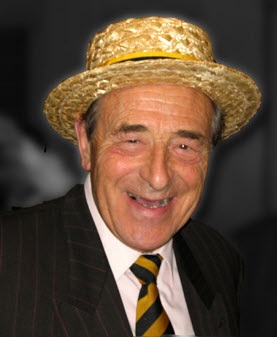 The club, cycling in general, the Norwood Paragon and the Reading Track League in particular,
suffered a great loss With the passing at 86 years of John Dennis, (Tom Cummins.) following a long
period of ill health.
The club, cycling in general, the Norwood Paragon and the Reading Track League in particular,
suffered a great loss With the passing at 86 years of John Dennis, (Tom Cummins.) following a long
period of ill health.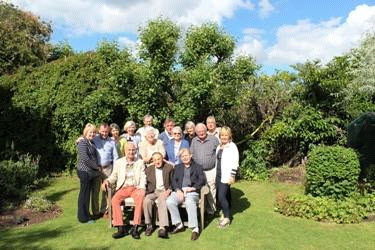 During his cycle-racing career he wrote competition reports for newspapers including the
Daily Mail and Daily Mirror. This led to his appointment as racing editor of
Cycling, a magazine published by Temple Press. Another of this publisher’s titles at the time was
Commercial Motor, the prominent weekly for truck and bus operators, and an ambitious Mr Dennis soon
successfully applied for the post of news editor. From there, in 1962, he was hired by AEC finance director
Jim Slater to be publicity manager and editor of the London-based truck- and bus maker’s internal
publications.
During his cycle-racing career he wrote competition reports for newspapers including the
Daily Mail and Daily Mirror. This led to his appointment as racing editor of
Cycling, a magazine published by Temple Press. Another of this publisher’s titles at the time was
Commercial Motor, the prominent weekly for truck and bus operators, and an ambitious Mr Dennis soon
successfully applied for the post of news editor. From there, in 1962, he was hired by AEC finance director
Jim Slater to be publicity manager and editor of the London-based truck- and bus maker’s internal
publications.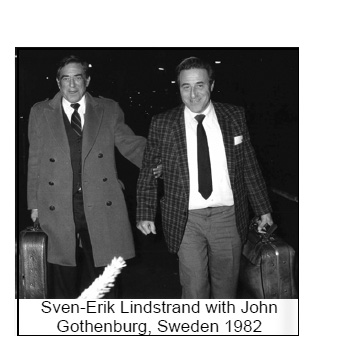 The cordiality for which Mr Dennis was renowned remained much in evidence long after his
retirement. Until quite recently he was organising regular get-togethers of many current and former road
transport journalists. And his love of cycle racing also proved remarkably durable, demonstrated by
organisation of Reading race meetings until only a few years ago.
The cordiality for which Mr Dennis was renowned remained much in evidence long after his
retirement. Until quite recently he was organising regular get-togethers of many current and former road
transport journalists. And his love of cycle racing also proved remarkably durable, demonstrated by
organisation of Reading race meetings until only a few years ago.